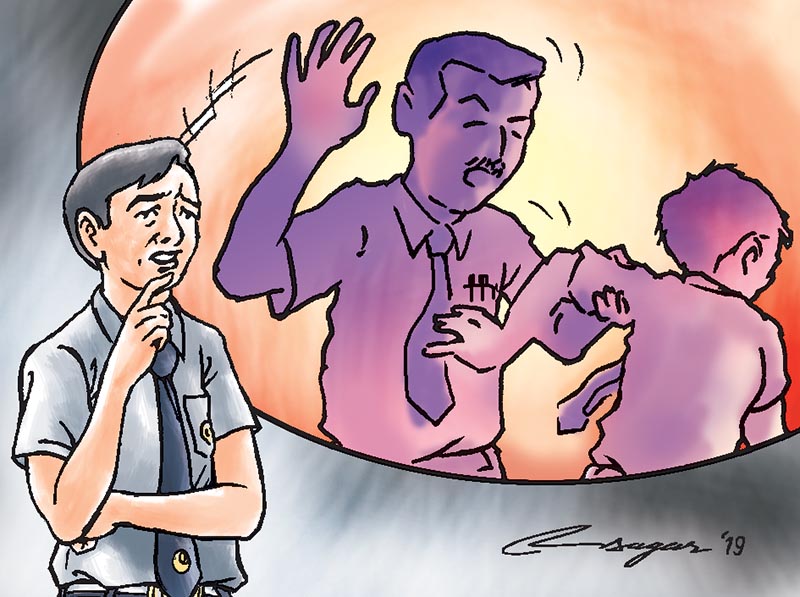Spare all kinds of rods: They are ineffective
While cases of outright physical torture like beating with sticks, slapping, pulling the ears or making them stand for academic dishonesty or misbehaviour might have declined, emotional punishments like scolding, abusing and humiliating are still practised
A colleague recently shared an incident concerning her 11-year-old child, which as a teacher was as shocking for me to hear as it must surely have been to her as a parent when she first discovered it. Ironically, the child’s habit of spending too much time on her tab was conveyed to her class teacher by none other than the parent herself with the mistaken hope of bringing about a desired change in the child through the former’s help. What followed apparently was the child being called out the next day and getting slapped by the very teacher before her classmates! What is even more shocking is that the teacher is said to have kept slapping without saying anything to the child. This happened in the very first period of the day. Badly hurt, less by the slap and more by the humiliation, the child upon returning home cried herself to sleep. Apparently, the child now is highly fearful of the teacher.
Anyone who has undergone similar experience at school can imagine what she must have felt all day at school following the incident. What is equally shocking here, if not more, is that the child didn’t even know what she was being punished for. Voices of those citing the need for corporal punishment gets overwhelmingly drowned out these days, but every now and then incidents like these do come to the fore, and views along the lines of ‘sometimes you do need to use the rod’ are still heard in school staff rooms. Never having used such tactics ever in my life as a teacher, I am not aware of the fruits of it, if there’s any at all, but it is hard to imagine how a child would get back on track or show positive behavioural change through slaps, sticks, jibes and sarcasm.
In Nepal, the new Children’s Act, 2018 has criminalised corporal punishment of children, making it the first country in South Asia and 54th country in the world to do so. Section 66 (d) of the Act criminalises physical and mental torture or degrading treatment of children either at home, school or other places. While cases of outright physical torture like beating with sticks, slapping, pulling the ears or making them stand for academic dishonesty or misbehaviour might have declined, emotional punishments like scolding, abusing and humiliating are still practised, even in some so-called progressive schools, which have mushroomed in Nepal in recent times. And the reason why the practice continues despite the policy reform of 2018 may be attributed largely to schools lacking a clear policy on the issue as well as poorly trained and unprofessional teachers.
Not long ago, a 10th grader being bashed black and blue by the very principal of his school was reported in the media with no shortage of sympathisers for the latter in the wake of the incident. Even the kids in their early childhood are not spared on the back of a much flawed and self righteous maxim like ‘It’s important to nip the misconduct in the bud.’ It is not very hard to see why such punitive measures are the most favoured course of action for many teachers: school management and even parents give tacit support to the use of such tactics which are as ineffective and short-lived as they are detrimental to children’s learning.
Additionally, it is convenient for teachers to go for an impulsive shout or a sarcastic remark if not physical abuse because the other way takes time and patience. Logical consequences are aimed at helping children develop self control and provide them with an opportunity to learn from their mistakes as opposed to punishment, which aims but miserably fails at correcting the child through external control and fear.
The change in the policy regarding corporal punishment will achieve very little if the real actors on the ground, that is, the school administrations and teachers do not comply with it. As far as compliance is concerned, it should also not be simply taken as being cognizant of the changed policy only at a philosophical level or being permissive towards whatever the students do. Adequate level of training on a periodic basis about the logical consequences for various classroom scenarios needs to be imparted to bring about that paradigm shift in teachers, many of whom may themselves have grown up receiving corporal punishment. The experience of working with middle school students informs this writer that children of that age group require constant reminders and feedback for any of their undesired behaviour and that snapping and scolding barely works.
Teachers can start with setting consequences that are related to the action and delivered respectfully as it is a common practice to mete out totally irrelevant punishments like cutting out their recess or extra-curricular time for just about anything that they do wrong in the classroom. Cutting out the recess time can indeed be a logical consequence but only if the child has chosen to misbehave with others during that time. A teacher sitting down with the same child later and reminding him/her of the expected recess time behaviour could help the situation further. But do the teachers have time for it? If making students responsible for their actions and allowing them a supportive environment to learn from their mistakes are our goals, logical consequences are the teachers’ best bet.
Neupane is with Kathmandu University






